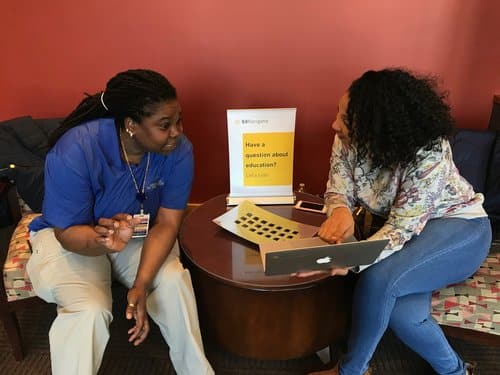STRATEGY 1: PARENTS AS PARTNERS
 Some schools actively seek to build a partnership with parents, and nonprofit organizations like the Flamboyan Foundation are able to forge collaboration between parents and educators.
Some schools actively seek to build a partnership with parents, and nonprofit organizations like the Flamboyan Foundation are able to forge collaboration between parents and educators.
“Too many people think power in education is a zero-sum gain,” cautions Kristin Ehrgood, president and founder of Flamboyan. “Teachers have power. Parents have power. We help them work on the same team so that this power is additive and focused on serving children. Every family wants to guide their child’s educational path — to do that, they must have authentic relationships of equal power with their child’s teacher. At Flamboyan, we work with educators and school systems to build effective partnerships with families by asking educators to examine their beliefs and actions toward families.”
Organizations like Flamboyan help willing schools create this partnership. In other communities where schools do not seek out parents as partners, nonprofits work to inform and organize parents to understand the power they can exercise independently outside of school to help educate their children, and equip them with the knowledge and tools to do it.
Some may say that parents empowered as educators aren’t really “power that drives systems change” because it is improving the education of individual children and not taking on any fundamental structural issues within the system. However, in response to that, we would share two points.
First, research shows that parents’ being effectively engaged in the education of their children is associated with a positive impact on learning. A 2015 Johns Hopkins evaluation of Flamboyan found that their work to create parent/school partnerships was more likely to result in lower truancy and better reading outcomes.
Second, a journey of empowerment has to start somewhere. For many parents, realizing they have the power to contribute to the education of their children is in itself a mighty thing. And for some, exercising their power for their individual children helps them realize that this is only the start of what they can do. It also helps them identify if there are larger structural challenges in their school or school system, and helps them realize that they have the power to address these.

225 Franklin Street, Suite 350
Boston, MA 02110
617.912.8800
This work is licensed under a Creative Commons Attribution-NonCommercial-ShareAlike 2.0 License (CC BY-NC-SA 2.0)
Click Here to learn more.
